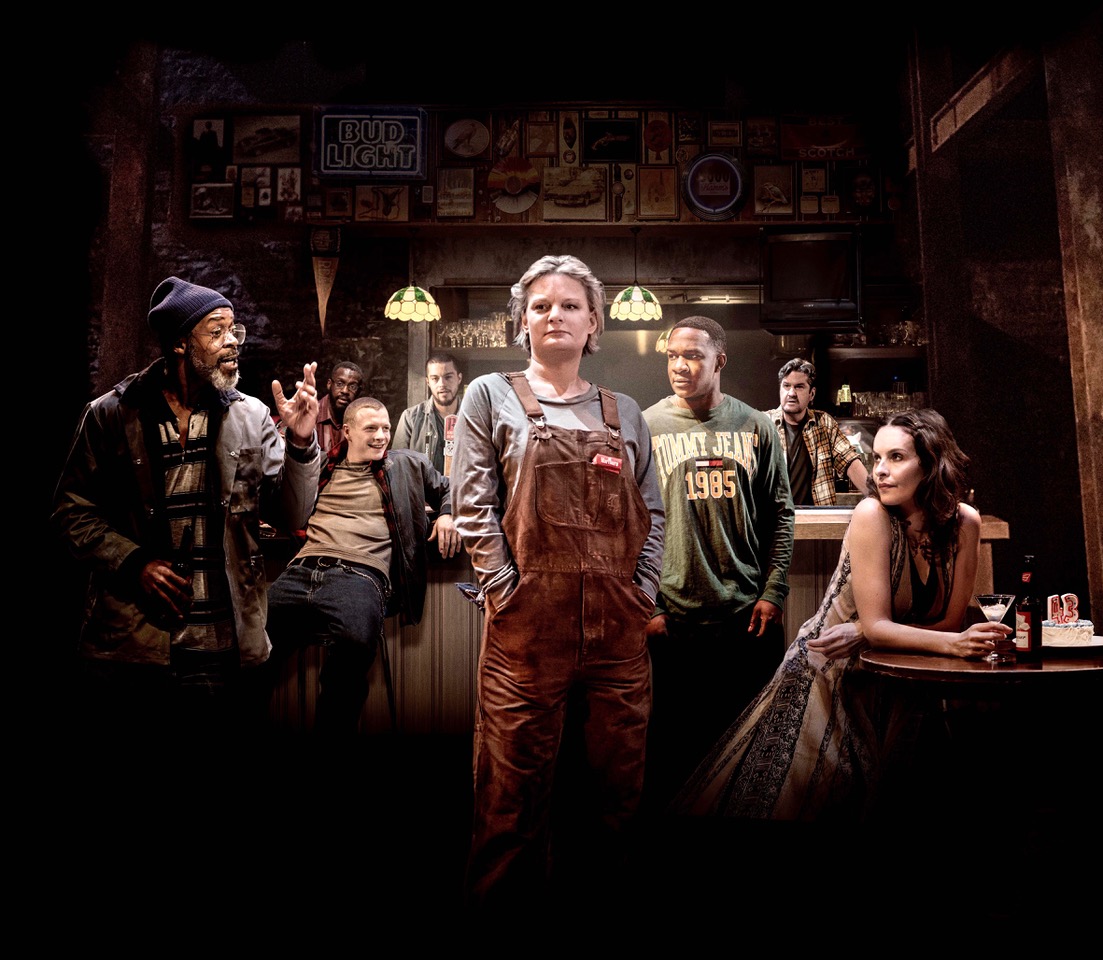If you’re unfamiliar with the feeling of despair that living in a small town when things go wrong can evoke, then you’re in for both an education and a treat. Sweat, a Pulitzer Prize-winning play written by Lynn Nottage, is a nostalgic cocktail exploring class, poverty, drugs, friendship and race at the turn of the millennium. Despite this, the themes are so very current with what’s going on right now – both is the US and the UK.
Sweat is an emotionally raw snapshot into a period of history
This production at the Donmar, directed by Lynette Linton, is set in a US industrial working class-Rust Belt town. The plot is light but the consequences heavy – it centres around the unionised working-class people of a town. These characters are either related to each other or friends who grew up together, but they all work at the same factory. Deindustrialisation happens, and through these people’s interactions and actions, we see their lives unravel.
We open on an exchange between Jason, a young white man and Evan, his black parole officer. Race immediately comes to mind as being important here because of Jason’s swastika tattoo. On his face. We learn through Jason’s monosyllabic responses to Evan’s conversation that he has a job and has bumped into an old friend. It feels like Patrick Gibson has used Eminem as his muse for playing Jason; and it’s effective in creating a likeable character – despite the fact that I’m afraid to look him in the eyes (I’m only three feet away from him in the second row). Sule Rimi as Evan is controlled, showing a good range of depth and emotion in the limited time he has on stage.
The transitions between scenes are punctuated by rumbling and troubling sonic idents and low lighting – I particularly enjoy the half transitions, where Evan finishes between talking to Jason but then starts talking to Chris, another young man; instead of simply exiting the stage, Jason lingers for a minute beforehand, so that the reality and the feeling of the moment have strong presence, the young men connected not through time but through emotion. British actor Osy Ikhile makes for a powerful and believable Chris, his American accent flawless and therefore not a distraction to his portrayal of a smart young black man.
The set change to the bar scene, where the main action takes place, uses pulleys and actors, seamlessly and effectively – the bar is intense and intimate, almost cosy, leaving me seriously considering finding a similar all-American bar after the show.
The unspoken is as important as what is said throughout; there’s an implication that, along with everything else, this small town is also being ravaged by drugs. Wil Johnson’s character speaks to this, using his skill and experience well to give us a Brucie that’s both a pitiful junkie father and a once passionate ex-union man. I’m utterly convinced by the deep friendship between Cynthia (Clare Perkins) and Tracey (Martha Plimpton) and even more true is how they interact with their third-wheeling friend Jessie (Leanne Best plays one of the best drunken hippies I’ve come across). Plimpton delivers Tracey’s stunning reverie, where she describes her grandfather’s hands that is edged with regret and burning pride that I feel as though it is my own grandfather. Her words are steeped in the history of family, of forgotten allegiance and resistance to change.
And it’s this lamentation that’s the heart of Sweat. I feel a deep sense of pity because the little this community has to hang onto is so fragile. What was once strong and stable has become flimsy and fickle. We feel the regret that they’ve allowed this to define their life choices, including their choice to remain where they are in life. The dialogue is tinged with the (herbal) smoke of regret and anger that all of this has slipped beyond their control.
The second half builds rapidly, to the moment that explains the story-defining incarceration. We finally see more performance from both the barman Oscar (Sebastian Viveros) and Stan (Stuart McQuarrie). Violence that’s well-choreographed by Kate Waters draws audible gasps from the crowd, and emotions run so high that I actually cry at the end – not least because of McQuarrie’s superbly nuanced performance. Sweat is an emotionally raw snapshot into a period of history I know nothing about but somehow now feel and understand.

























![Sweat by Lynn Nottage 3 Clare Perkins (Cynthia) and Wil Johnson (Brucie) in Sweat at the Donmar Warehouse directed by Lynette Linton, designed by Frankie Bradshaw. [Photo Johan Persson]](https://www.afridiziak.com//wp-content/uploads/2018/12/Clare-Perkins-Cynthia-and-Wil-Johnson-Brucie-in-Sweat-at-the-Donmar-Warehouse-directed-by-Lynette-Linton-designed-by-Frankie-Bradshaw.-Photo-Johan-Persson-17.jpeg)
![Sweat by Lynn Nottage 4 Leanne Best (Jessie), Martha Plimpton (Tracey), Clare Perkins (Cynthia) in Sweat at the Donmar Warehouse directed by Lynette Linton, designed by Frankie Bradshaw. [Photo Johan Persson]](https://www.afridiziak.com//wp-content/uploads/2018/12/Leanne-Best-Jessie-Martha-Plimpton-Tracey-Clare-Perkins-Cynthia-in-Sweat-at-the-Donmar-Warehouse-directed-by-Lynette-Linton-designed-by-Frankie-Bradshaw.-Photo-Johan-Persson-16.jpeg)
![Sweat by Lynn Nottage 5 Wil Johnson (Brucie) and Stuart McQuarrie (Stan) in Sweat at the Donmar Warehouse directed by Lynette Linton, designed by Frankie Bradshaw. [Photo Johan Persson]](https://www.afridiziak.com//wp-content/uploads/2018/12/Wil-Johnson-Brucie-and-Stuart-McQuarrie-Stan-in-Sweat-at-the-Donmar-Warehouse-directed-by-Lynette-Linton-designed-by-Frankie-Bradshaw.-Photo-Johan-Persson-13.jpeg)
![Sweat by Lynn Nottage 6 Patrick Gibson (Jason) and Osy Ikhile (Chris) in Sweat at the Donmar Warehouse directed by Lynette Linton, designed by Frankie Bradshaw. [Photo Johan Persson]](https://www.afridiziak.com//wp-content/uploads/2018/12/Patrick-Gibson-Jason-and-Osy-Ikhile-Chris-in-Sweat-at-the-Donmar-Warehouse-directed-by-Lynette-Linton-designed-by-Frankie-Bradshaw.-Photo-Johan-Persson-11.jpeg)
![Sweat by Lynn Nottage 7 Clare Perkins (Cynthia) and Martha Plimpton (Tracey) in Sweat at the Donmar Warehouse directed by Lynette Linton, designed by Frankie Bradshaw. [Photo Johan Persson]](https://www.afridiziak.com//wp-content/uploads/2018/12/Clare-Perkins-Cynthia-and-Martha-Plimpton-Tracey-in-Sweat-at-the-Donmar-Warehouse-directed-by-Lynette-Linton-designed-by-Frankie-Bradshaw.-Photo-Johan-Persson-7.jpeg)
![Sweat by Lynn Nottage 8 Stuart McQuarrie (Stan) in Sweat at the Donmar Warehouse directed by Lynette Linton, designed by Frankie Bradshaw. [Photo Johan Persson]](https://www.afridiziak.com//wp-content/uploads/2018/12/Stuart-McQuarrie-Stan-in-Sweat-at-the-Donmar-Warehouse-directed-by-Lynette-Linton-designed-by-Frankie-Bradshaw.-Photo-Johan-Persson-6.jpeg)


